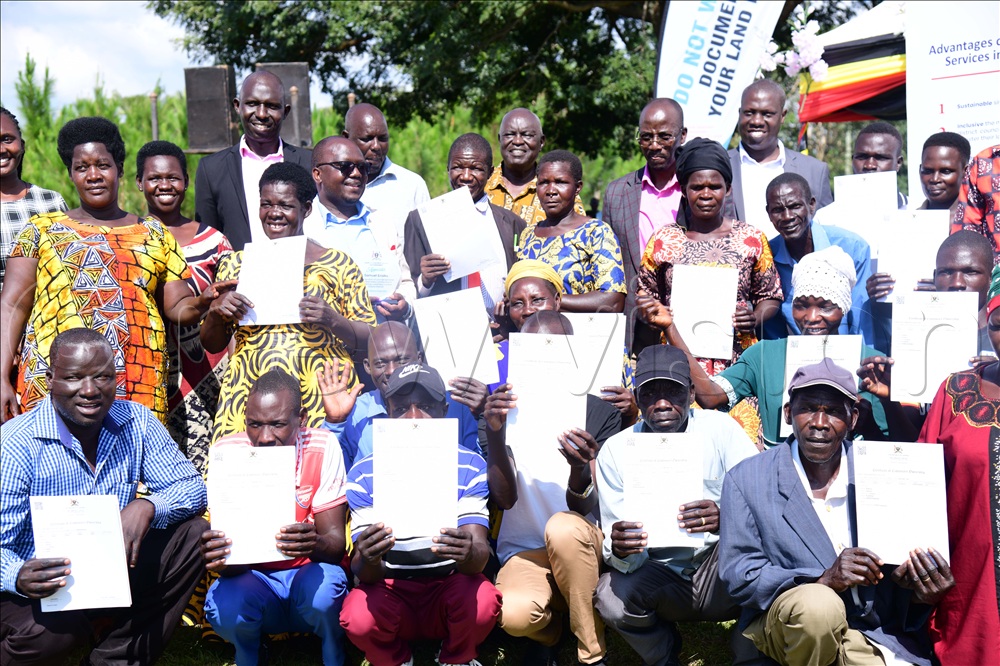Customary land titles should unite, not divide, minister Mayanja tells Lango
“By issuing Certificates of Customary Ownership, we are not just producing paper, we are producing security, peace, and hope," Mayanja said
Commissioner for policy Analysis, Henry Irumba Harrison. and Samuel Eriaku, the deputy team leader of the GIZ Responsible Land Policy Project in Uganda (RELAPU) handing over a land title to the owners. (Photos by Godfrey Ojore)
________________
About 70% of land in Uganda is held under customary tenure. For decades, communities under this system faced the risk of land grabbing and marginalisation simply because their rights were undocumented.
Kato Amolo, 48, a widow of seven in Bato subcounty in Dokolo district, nearly lost her late husband’s land when her brother-in-law threatened to evict her.
“They asked me to leave my matrimonial home together with my children on account that they do not know me,” Amolo, who lost her husband to the Lord's Resistance Army (LRA) rebels, said.
Similarly, Docus Ateng, 37, a mother of six in Teilwa, Amwoma subcounty, faced threats when her husband abandoned her and allegedly went to Kenya.
“I was beaten by the relatives of my husband as they wanted me to leave their land. They said I should follow my husband in Kenya and allow them to sell their land,” Ateng explained.
Morish Obua, 35, whose parents died when he was young, was also at risk of losing his inheritance to his uncles.

Beneficiaries and leaders pose with their land titles.
“My uncles told me that my father had no portion of land and so I had no land to inherit. Even when it was clear from the clan leadership that my father had left land he inherited from his parents, my uncles wanted to grab my father’s share from me,” Obua said.
These cases illustrate the wider challenges facing customary landowners due to the lack of proper documentation.
The deputy chief administrative officer, Godfrey Epere, noted that over 80% of customary owners are vulnerable because they are youth, elderly, disabled, or women unable to register land themselves.
To address this, the German Federal Ministry for Economic Cooperation and Development (BMZ) supported improved access to land in Central and North-Eastern Uganda, targeting poverty and hunger reduction for marginalised groups.
Many people have since obtained certificates of customary ownership (CCOs), securing their land from relatives or strangers.
“I nearly developed hypertension over the safety of land, but with my title at hand, I’m peaceful because the safety of my children is guaranteed. Nobody will come to disturb us,” Amolo said.
Samuel Eriaku, the deputy team leader of the GIZ Responsible Land Policy Project in Uganda (RELAPU), said the project has mapped over 4,500 land parcels in Dokolo district and processed more than 2,000 CCOs, successfully integrating them into the Uganda National Land Information System (UgNLIS).
Over 11,000 people in Teso and more than 8,500 in Lango have benefited from land titling.
At the closure of the project in Dokolo, lands state minister Sam Mayanja was the chief guest and was represented by the commissioner for policy Analysis, Henry Irumba Harrison.
“The RELAPU Project is not just another development intervention. It is part of a global response to the twin challenges of hunger and poverty, focusing on one of the most critical resources, land,” Mayanja said.
He urged Lango and Teso communities to protect their newly acquired land rights.
“By issuing Certificates of Customary Ownership, we are not just producing paper, we are producing security, peace, and hope. A certificate in the hands of a widow or an orphan is a shield against dispossession. A certificate for a farmer is a key to credit, investment and better livelihoods,” he explained.
He cautioned that these titles should foster unity rather than division.
“Guard your certificates jealously, use them responsibly, and let them be a source of unity, not division. To the leaders: continue to champion fair, transparent and inclusive land governance,” the minister advised.